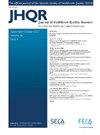多成分干预对住院临床患者疗效的影响:在一家大学医院进行的一项前后研究。
IF 1
Q4 HEALTH CARE SCIENCES & SERVICES
引用次数: 0
摘要
背景和目的:住院治疗严重影响个人的身心健康,在住院期间和出院后都会发生。为了最大限度地降低住院期间和出院后的发病率,人们提出了不同的方法,尤其是那些旨在降低再入院率的方法。本研究旨在评估多成分干预(MI)对操作指标和持续护理结果的影响:在巴西一所大学医院开展的准实验研究,旨在比较干预措施与常规护理的影响。干预措施是在一家综合医院的临床科室实施多学科查房,纳入导航护士的角色,并与一半的内科团队开展护理过渡行动。住院的成人患者分为两个时期,并分为三组--A组:干预前;B组:干预后且实施了多学科综合查房;C组:干预后且未实施多学科综合查房:结果:共评估了 2333 例住院患者。转入重症监护室(ICU)和住院时间(LOS)均有所缩短。干预前后比较,住院时间、中午前出院率和转入重症监护室率均有所改善,但干预后有心肌梗死和没有心肌梗死的组别没有差异:这些结果反映出管理信息系统改善了护理工作,这种效果可能是由于交叉感染造成的,也可能是由于未进行干预的团队造成的。本文章由计算机程序翻译,如有差异,请以英文原文为准。
Impact of multicomponent intervention on hospitalized clinical patient outcomes: A pre–post study in a university hospital
Background and objective
Hospitalization significantly interferes with the individual's well-being and it occurs both during and after the hospitalization period. Different approaches to minimize morbidity related to hospitalization and the post-discharge period have been proposed, especially to those aimed at reducing readmission rates. The aim of this study is to evaluate the effect of multicomponent intervention (MI) on operational indicators and continuity of care outcomes.
Materials and methods
A quasi-experimental study conducted in a Brazilian university hospital in order to compare the impact of the intervention with usual care. The MI was the implementation of multidisciplinary rounds, the inclusion of the role of the navigator nurse, and care transition actions with half of the Internal Medicine teams in a clinical unit of a general hospital. Adult patients hospitalized were included in 2 periods and divided in 3 groups – Group A: before the intervention; Group B: after and with MI; Group C after and without MI.
Results
A total of 2333 hospitalizations were evaluated. There was a reduction in the rate of intensive care transfers to intensive care unit (ICU) and in the length of stay (LOS). LOS, discharge before noon, and transfers to ICU improved when comparing before and after the intervention, but were not different in post-intervention groups with and without MI.
Conclusion
These results reflect the improvement of care provided by MI, an effect that could be due to cross contamination also to teams without the intervention.
求助全文
通过发布文献求助,成功后即可免费获取论文全文。
去求助
来源期刊

Journal of Healthcare Quality Research
Medicine-Health Policy
CiteScore
1.70
自引率
8.30%
发文量
83
审稿时长
57 days
期刊介绍:
Revista de Calidad Asistencial (Quality Healthcare) (RCA) is the official Journal of the Spanish Society of Quality Healthcare (Sociedad Española de Calidad Asistencial) (SECA) and is a tool for the dissemination of knowledge and reflection for the quality management of health services in Primary Care, as well as in Hospitals. It publishes articles associated with any aspect of research in the field of public health and health administration, including health education, epidemiology, medical statistics, health information, health economics, quality management, and health policies. The Journal publishes 6 issues, exclusively in electronic format. The Journal publishes, in Spanish, Original works, Special and Review Articles, as well as other sections. Articles are subjected to a rigorous, double blind, review process (peer review)
 求助内容:
求助内容: 应助结果提醒方式:
应助结果提醒方式:


